Mixing surface and scatterplot in a single 3D plot
I am studying the patterns of distribution of whales around specific seabed structures. I am trying to create an interactive 3D plot showing at the same time:
- bathymetry as a surface (
x= longitude,y= latitude,z= depth), and - geographic location of whale groups (
x= longitude,y= latitude,z= fixed depth -30 meters for example).
Coordinates are projected in a UTM coordinate system.
I usually work with R and the ggplot2 package for producing figures. Here, the plotly package seemed like a good option.
I started with a bathymetry raster bathy_ras and a data.frame of points points.
> bathy_ras
class : RasterLayer
dimensions : 784, 821, 643664 (nrow, ncol, ncell)
resolution : 102, 111 (x, y)
extent : 755070, 838812, -2612148, -2525124 (xmin, xmax, ymin, ymax)
coord. ref. : +proj=utm +zone=58S +datum=WGS84 +ellps=WGS84 +towgs84=0,0,0
data source : in memory
names : bathymetry
values : -1949.42, -34.27859 (min, max)
> str(points)
'data.frame': 214 obs. of 3 variables:
$ x: num 774264 777293 775476 773430 773284 ...
$ y: num -2534165 -2533556 -2531012 -2532904 -2533695 ...
$ z: num -30 -30 -30 -30 -30 -30 -30 -30 -30 -30 ...
I can't find a way to combine my two datasets on the same graph/same axis. I tried two methods but none gave me the output I wanted.
1) Creating the plot in Rstudio using plotly package.
#convert raster into a matrix of bathymetry values
bathy_matrix <- as.matrix(bathy_ras)
> str(bathy_matrix)
num [1:784, 1:821] -362 -365 -367 -369 -371 ...
#create interactive plot
p <- plot_ly(z=bathy_matrix, type="surface",showscale=FALSE)
#this works fine, it get a 3D interactive surface plot of the seabed
#but if I try to add the "points" layer it doesn't show on the plot
p <- plot_ly(z=bathy_matrix, type="surface",showscale=FALSE) %>%
add_trace(x = gp_seamounts_df$utmx, y = gp_seamounts_df$utmy, z = gp_seamounts_df$z, type = "scatter3d", mode = "markers", showscale=FALSE, opacity=0.98)
2) Creating the plot entirely from the plotly website. First I converted the raster "bathy_ras" into a matrix containing all points of coordinates (x,y) and depth z
#convert raster into a dataframe
bathy_df <- as.data.frame(coordinates(bathy_ras))
bathy_df$z <- values(bathy_ras)
> str(bathy_df)
'data.frame': 643664 obs. of 3 variables:
$ x: num 755121 755223 755325 755427 755529 ...
$ y: num -2525179 -2525179 -2525179 -2525179 -2525179 ...
$ z: num -362 -361 -360 -359 -358 ...
I created a plotly account. I imported two dataframes as .txt files in my plotly account: bathy_df and points.
This creates two grids in the plotly account. I can easily write two separate 3D plots for these two data.frames: one is a surface plot (shown below), the other is a scatterplot. I tried to include the scatterplot in the surface plot as a new trace following this tutorial (http://help.plot.ly/update-a-graphs-data/) but the "insert into" option just seem unavailable if the scatterplot is in 3D. surface plot produced from the plotly web interface
Is it possible to combine a scatter3D and a surface plot in plotly?
nb: I tried raster::persp in combinaison with points() but I am not very satisfied by the general aesthetic of the surface plot, which is why I would prefer to do this with plotly and/or ggplot2.
Answer
I believe what you are doing should work fine. I think it might have to do with your x and y coordinates. The surface plot is using 1:ncol(bathy_matrix) as the x-axis and 1:row(bathy_matrix) as the y axis points (ticks if you will).
Your points will need to have x and y coordinates in that range for them to show up in the surface plot. Below is a simple example.
set.seed(123)
x = sample(1:ncol(volcano), size = 50)
y = sample(1:nrow(volcano), size = 50)
z = c()
for(i in 1:50) {z <- c(z, volcano[y[i], x[i]])}
df <- data.frame(x, y, z)
plot_ly(z = volcano, type = "surface") %>%
add_trace(data = df, x = x, y = y, z = z, mode = "markers", type = "scatter3d",
marker = list(size = 5, color = "red", symbol = 104))
I get this:
Hope this helps...

